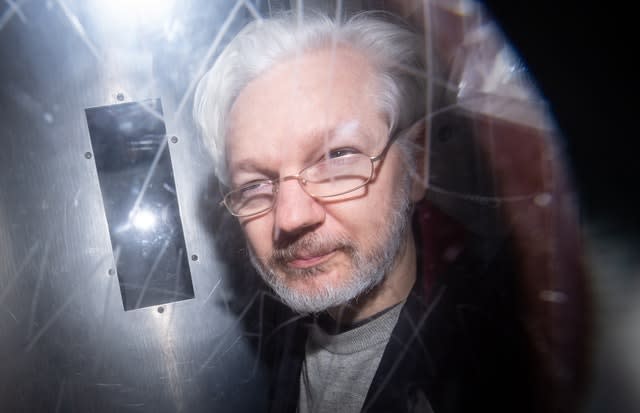Labour’s John McDonnell says Julian Assange should not be extradited to US
WikiLeaks founder Julian Assange should not be extradited to the US because it would “damage the democratic standing” of the UK, shadow chancellor John McDonnell has said.
The Labour politician on Thursday visited Assange for two hours at Belmarsh prison in southeast London, where the Australian is awaiting the start of an extradition hearing next week.
Speaking to the press afterwards by the prison gates, Mr McDonnell said: “I think this is one of the most important and significant political trials of this generation, in fact longer.
“I think it’s the Dreyfus case of our age.
“The way in which a person is being persecuted for political reasons, for simply exposing the truth for what went on in relation to recent wars.”

Mr McDonnell was referring to the 1895 conviction at a court martial of French officer Alfred Dreyfus on treason charges many felt were brought against him because he was Jewish.
He was later exonerated after a long campaign featuring intellectuals such as novelist Emile Zola who wrote a denunciation of the prosecution case entitled J’Accuse (I accuse).
Mr McDonnell said: “We’re hoping that in court he (Assange) is able to defeat the extradition bid.
“We don’t believe that extradition should be used for political purposes.”
Assange, 48, is wanted in the US to face 18 charges, including conspiring to commit computer intrusion, over the publication of US cables a decade ago.
If found guilty he could face up to 175 years in jail.

He is accused of working with former US army intelligence analyst Chelsea Manning to leak hundreds of thousands of classified documents.
Mr McDonnell said Assange’s health had been affected by his imprisonment but said he appeared “strong” and “determined” to fight his extradition.
“This is all about the protection of sources, whistleblowing, ensuring that people have true information in the public domain on which they can make they own judgments,” Mr McDonnell said.
He added: “I think if this extradition takes place it will damage the democratic standing of our own country as well as America.
“We have a long tradition in this country of standing up for journalistic freedom, standing up for the protection of whistleblowers and those who expose injustices.”
Mr McDonnell said he felt “anxious” over the “barbaric” treatment Assange has experienced in prison, where he said he spends 20 hours a day in his cell.
“I hoping that the hearings in the coming months will secure his freedom, there is no need for him to be locked up in a place like Belmarsh,” he said.
On Tuesday it emerged that fellow inmates at the high-security Belmarsh successfully lobbied for Assange’s release from solitary confinement.
Assange’s legal team have claimed his health has deteriorated in recent years as he sought to avoid extradition.
Assange’s father John Shipton said his son’s condition has improved, but said if he was extradited it would be akin to a “death sentence”.
“It demonstrates, I think, the political nature of the trial itself,” Mr McDonnell said.
He suggested there are “deeply held doubts” in Parliament and Government over Assange’s case.
He said he did not know the views of Labour leadership candidates, but added: “From my point of view, I’m hoping that the Labour Party overall will oppose this extradition.”
He said he wanted to see cross-party support for Assange in Parliament.
Mr McDonnell also urged people to join peaceful demonstrations in support of Assange outside the court when the hearings start.
The Council of Europe, of which the UK is a member state, said granting the extradition would have human rights implications “that reach far beyond his individual case” and would have a “chilling” effect of media freedom.
Its human rights commissioner, Dunja Mijatovic, said: “In view of both the press freedom implications and the serious concerns over the treatment Julian Assange would be subjected to in the United States, my assessment as Commissioner for Human Rights is that he should not be extradited.”
The hearing is due to begin at Woolwich Crown Court on Monday, beginning with a week of legal argument.

At a court hearing on Wednesday it emerged US President Donald Trump allegedly offered Assange a pardon if he said Russia was not involved in the leak of Democratic National Committee emails.
A series of emails embarrassing for the Democrats and the Hillary Clinton presidential campaign were hacked before being published by WikiLeaks in 2016.
The White House denied the allegation.
Assange has been held on remand in Belmarsh since last September after serving a 50-week jail sentence for breaching his bail conditions while he was in the Ecuadorian embassy in London.
He entered the building in 2012 to avoid extradition to Sweden over sex offence allegations, which he has always denied and were subsequently dropped.

 Yahoo News
Yahoo News 
